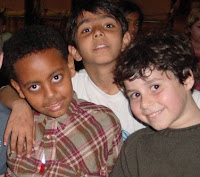This blog post subject is about various podcasts we were directed to listen to on I-Tunes. The podcasts included SmartBoard Lessons Podcast, KidCast, ConnectLearning, EdTechTalk, MacBreak Weekly and This Week in Photography. This assignment was great because I got to listen to many examples of how podcasts are done, how they sound and how they come across to the audience. I learned what to do and what not to do for our own podcast assignment.
SmartBoard Lessons podcast is the first one I listened to, it was hosted by Ben Hazzard and Joan Badger who are both teachers in Canada. I listened to Episode 11 which was lessons on how to wrap up the school year. Joan also talked about some very useful web links for teachers. She talked about a math movie link that sounded quite interesting. It alerted teachers and students to movies in modern day cinema that used math in them. These movies included Alice in Wonderland and National Treasure to name a few. I found the podcast to be interesting once they got to the subject, I think there was just a little too much chatting. It is also pretty interesting that these two people were not even in the same room together. They were doing the podcasts from their own offices miles away from each other.
Next I listened to KidCast which is learning and teaching with podcasting. It was episode #62 and it was hosted my one person, Dan Schmit. This podcast was very straight forward and got right to the point of the podcast. There were no guests just one man speaking his mind on video podcasting or "vodcasting." He had the opinion that video podcasting was not a natural progression from audio podcasting it was what best suits your message. One is not better than the other. He made the point that video podcasting can be used for content that needs a visual and it can also be used for students who are learning about body language. He said the downside of the video podcasting was the time factor, teachers and students don't have time to this kind of podcasting because it is time consuming.
ConnectLearning is a very informal podcast hosted by David Warlick. I listened to Episode 90 in which he was at a conference of librarians and they were brainstorming about ways to use the podcast in the classroom. Some said that the podcast could be used to record class sessions and that students could use them at home for homework and projects. David did point out that this is being implemented at the college level but not so much at the K-12 level. Another teacher said that the podcast could be used to interview school faculty and employees and those interviews could be added to the school website for parents and potential students to view. I really liked this podcast because it provided some great ideas to teachers.
EdTechtalk podcast was talking about teachers teaching teachers or what are we learning from our colleagues. This podcast went back to a moderator and guest speakers format with varying opinions to different questions. All of the guests were asked to talk about what projects they were working on and how they were helping teachers. It sounded like they were heading up workshops that teachers were attending during their summer break to enhance them professionally. Some of the speakers also talked about projects that they got going with their students. An example of this is a project where kids create a cooking show recorded as a podcast.
The last two podcasts were very "techy" and they were of little interest to me. They were MacBreak Weekly and This Week in Photography. MacBreak Weekly is a podcast that discusses the latest Mac news from a journalist standpoint. It is really a round table discussion on all things Mac. They discussed the new I-Phone and the WWDC. As I am a PC user none of this interested me at all. The last podcast I listened to was about photography. This Week in Photography discusses camera technique, technology and news. Once again they were talking about Apple and new RAW updates to various cameras.






